NRNP 6645 Week 11 Final Exam
- $49.00
- Question: In child psychotherapy consideration of systems that promote a child’s ongoing development include which of the following?
- Question: Which of the following is a philosophical approach to psychotherapy which deals with
universal themes of life?
- Question: Dysregulation of this area of the brain is associated with memory problems and this person may be unable to integrate memories into the present and personal memory into identity, and thought to underlie symptoms of flashbacks, nightmares, avoidances and dissociation.
- Question: Which of the following is true about communication with children and adolescents?
- Question: There is growing evidence that some behavior problems can be prevented in children. Effective ____ prevention strategies do not include which of the following?
- Question: The Dialectical Behavior Therapy (DBT) therapist meets with the client, negotiates the goals of therapy, and arrives at a commitment to the treatment. Assumptions and principles of the DBT model are explained. This is consistent with which stage of treatment within the DBT model?
- Question: When referring a patient to a 12-step group the advanced practice psychiatric nurse realizes which of the following supports successful patient engagement in 12-step group participation?
- Question: Which of the following medications may be recommended for patients with insomnia due to PTSD?
- Question: The Gestalt Therapist working with a patient notices that every time a sensitive issue come
up the patient will change the topic and tell a joke. The therapist recognizes this interruption as which of the following?
- Question: In working with an older adult patient in the termination phase the advanced practice
psychiatric nurse suggests it may be helpful to teach family members ways to support the patient and prevent relapse. This demonstrates which of the following?
- Question: A specific type of CBT therapies aimed to reduce distress as a person experiences sensation with danger is known as which of the following?
- Question: The loss of control over the intense urge to take a drug even at the expense of adverse consequences is known as which of the following?
- Question: The primary source for constructive change in a humanistic-existential approach is which of the follow:
- Question: A Trauma Resiliency Model therapist encourages the patient to describe the “felt sense” of internal or external body sensations associated with resilience, stress, and release. This is known as which of the following Trauma Resiliency Model skills?
- Question: Using a Common elements approach with a child with ADHD who despite stimulant medication continues to exhibit frequent angry outbursts, opposition and aggression the advanced practice psychiatric nurse begin with which of the following?
- Question: Practice guidelines for complex trauma and dissociative identity disorder caution that which of the following may limit one’s ability to heal.
- Question: Which of the following is consistent with a Common Elements approach?
- Question: Which of the following is not an underlying assumption that differentiates child therapies from adult psychotherapy?
- Question: The person-centered therapist who is genuine and authentic during the therapy session is exhibiting ____ which psychological condition?
- Question: Review of child specific Evidence Based Practices (EBP) demonstrate progress in some
treatment areas however there is still much work to be done particularly in use of EBPs guided by diagnostic criteria in children with which of the following disorders?
- Question: The advanced practice psychiatric nurse notices in working with a patient with a dissociative disorder that the person appears to be doing worse after significant gains are made. The advanced practice psychiatric nurse explains the reason for this is likely which of the following?
- Question: The use of medications is indicated in combination with psychosocial interventions in several child and adolescent severe emotional disorders (SED) including which of the following?
- Question: Research suggests that psychodynamic therapeutic approaches are effective for some
children, particularly those with which of the following disorders?
- Question: Evidence-based therapeutic modalities for treating older adults with anxiety include which of the following:
- Question: The advanced practice psychiatric nurse is working with the patient on maintaining
treatment outcomes and developing a guide for surviving difficult times. These strategies are consistent with which phase in the CBT process?
Therapies and Older Adults?
- Question: The advanced practice psychiatric nurse realizes a basic assumption of Dialectical Behavior
Therapy (DBT) is that therapists treating the difficult patient need support. This support includes which of the following?
- Question: During the middle phase of CBT with an older adult the advanced practice psychiatric nurse
notices that homework is not getting done and suggest that the homework be done during the therapy session. This indicates which of the following?
- Question: Research support that children with serious emotional disorders (SED) are likely to have
which of the following?
- Question: The role of the therapist during Stage 4 of the Dialectical Behavior Therapy procession
model includes which of the following?
- Question: In working with an older female patient, the advanced practice psychiatric nurse notices the
patient seems to respond superficially reminding the advanced practice psychiatric nurse of her own mother and finds herself looking forward to their sessions, which recently have been going longer than scheduled. The advanced practice psychiatric nurse recognizes this as
- Question: The Gestalt therapist notices the patient is fidgeting with fingers, legs are shaking and asks
the patient “What are you experiencing right now in your body?” This is a type of creative experimentation known as which of the following?
- Question: Which of the following is a biologically based psychotherapy methodology used to treat
patients who have experienced trauma?
- Question: Functional status refers to
- Question: Which of the following is not consistent with the Principles of Effective Treatment for
Addiction according to the NIH?
- Question: The purpose of Mindfulness-Based Stress Reduction in the older adult is
- Question: Critical goals in addiction treatment include improving impulse control, reducing craving,
and promoting and adaptive social environment. Evidenced based skills that can best impact these goals include:
- Question: In working with a patient with borderline personality disorder, the Dialectical Behavior
Therapy (DBT) therapist emphasizes suicidal and self-harming behaviors are problems to be solved and are the highest priority for treatment. Which of the following would be inconsistent with DBT therapy?
- Question: In following the rules for the Dialectical Behavior Therapy (DBT) therapist, the therapist
would not do which of the following?
- Question: Which of the following screening tools is geared toward screening pregnant women for
alcohol and drug abuse
- Question: The advanced practice psychiatric nurse proficient in Interpersonal Psychotherapy (IPT) is
working with an older adult who does not realize she has depression. Which of the following is true?
- Question: Which of the following is not consistent with the use of mindfulness in patients requiring
stabilization following trauma?
- Question: Challenges assessing psychiatric symptoms in the elderly include which of the follow
- Question: In using trauma-focused cognitive behavioral therapy with a child exposed to domestic
violence the advanced practice psychiatric nurse realizes the first component of this structured approach includes which of the following?
- Question: According to a Gestalt framework, to uncritically accept others’ beliefs and standards
Without _____ discriminating and assimilating what belongs to self or not, is a dysfunctional process known as which of the following:
- Question: Which of the following is not consistent with what is known about relapse?
- Question: An advanced practice psychiatric nurse who has been leading groups for patients with
comorbid PTSD and Substance abuse starts experiencing disturbing dreams, anxiety, irritability, withdrawal and problems in interpersonal relationships. These symptoms are consistent with the phenomenon of:
- Question: Which of the following statements is consistent with a humanistic-existential approach when the patient starts talking about past event?
- Question: Memories of the drug related event may be modified through various therapies including which of the following
- Question: Which of the following is not consistent with humanistic-experiential techniques?
- Question: In working with an older adult female patient, the advanced practice psychiatric nurse
notices that the patient starts bringing her baked goods, and says “You remind me so much of my daughter, you are so easy to talk to.” The advanced practice psychiatric nurse recognizes this as
- Question: Which of the following trends life trends suggests advanced practice psychiatric nurse be
prepared to provide mental health and illness treatment in a variety of community and non- traditional settings.
- Question: The advanced practice psychiatric nurse using Dialectical Behavior Therapy with a patient
with borderline personality disorder uses persuasive dialogue to do which of the following?
- Question: Evidence supports which of the following statements about women and addictions treatment?
- Question: Which of the following is not consistent with Eye Movement Desensitization and Reprocessing (EMDR) literature in treating PTSD?
- Question: The advanced practice psychiatric nurse encourages the older adult to recall long forgotten
experiences, events which are memorable to the person. This is known as
- Question: Dysfunctional processes, developed early in life that people employ in an attempt to meet
their _____ Needs, are referred to by the Gestalt therapist as which of the following?
- Question: The therapeutic frame supports the clinician in which of the following ways? Select all that
apply.
- Question: The advanced practice psychiatric nurse is working with a patient with who is chronically
suicidal. The advanced practice psychiatric nurse using a Dialectical Behavior Therapy (DBT) approach realizes which of the following?
- Question: The concept of resiliency in child therapies is in direct contrast to which traditional approach for treating children?
- Question: Stigma of mental illness in the elderly:
- Question: Which of the following is not consistent with the Psychoanalyst’s perspective when treating
and individual with a personality disorder?
- Question: Which of the following statements would not be consistent with the humanistic-existential
concept of “holism” ?
- Question: Which of the following is true about dreamwork from a Gestalt perspective?
- When the advanced practice psychiatric nurse builds a formulation when working with a
child in therapy the advanced practice psychiatric nurse is doing which of the following?
- Question: In providing psychoeducation to patient’s in recovery, the advanced practice psychiatric
nurse would not include which of the following?
- Question: Which best describes gerotranscendence?
- Question: The advanced practice psychiatric nurse is working with a group of patients in an outpatient
substance abuse treatment program. One patient comes to the advanced practice psychiatric nurse after the group session and asks if the advanced practice psychiatric nurse would meet at a nearby Starbucks to clarify a couple of questions that came up at the end of the session and fears relapse. Which of the following would be consistent with the traditional therapeutic frame?
- Question: The situation in which increasing amounts of a substance is needed to achieve the same
desired effect is known as which of the following?
- Question: Which of the following describes the basic neurobiological pathways of the reward system in the brain?
- Question: Evidence supports use of Dialectical Behavior Therapy patients with which of the following
diagnoses?
- Question: The existential concept of an openness, readiness, and flexibility to grow and change, which
necessitates a capacity to choose alternatives, and shape one’s own destiny as authors of creating their own world is which of the following?
- Question: Using a psychodynamic psychotherapy stage oriented model for the treatment of trauma, the advanced practice psychiatric nurse would do which of the following in Stage 1?
- Question: The advanced practice psychiatric nurse is working with a patient who states she believes
her boss hates her. After some discussion, it is clear the patient has strong negative feelings towards her boss. The advanced practice psychiatric nurse working within a Gestalt framework, recognizes this as an interruption consistent with which of the following?
- Question: The patient in Dialectical Behavior Therapy (DBT) expresses frustration that the skills taught don’t work, the process is taking too long, and is struggling to complete homework. The advanced practice psychiatric nurse using a DBT model would do which of the following?
- Question: An organized, consistent set of perceptions about the self, continually influenced by
experience and its interpretation which includes self-worth, self-image and ideal self, is which key concept of person-centered therapy?
- Question: The advanced practice psychiatric nurse using a Dialectical Behavior Therapy approach with a patient with Borderline Personality Disorder explains the four essential elements which includes all but which of the following?
- Question: The advanced practice psychiatric nurse working with a patient with a borderline character
structure realizes the psychodynamic treatment of choice for those with borderline character structure is which of the following?
- Question: The advanced practice psychiatric nurse working with a patient with borderline personality
disorder is aware that which of the following attachment styles has been highly correlated with Borderline personality disorder?
- Question: The advanced practice psychiatric nurse using supportive psychotherapy with a patient with
a preoccupied attachment style would use which of the following interventions?
- Question: The patient in Dialectical Behavior Therapy (DBT) is focusing of self-efficacy,
interdependence and self-dependence. At times, the patient seems bored with therapy, and reports dealing quickly and effectively with self-harming urges that have resurfaced. The advanced practice psychiatric nurse using the DBT model would do which of the following?
- Question: Which of the following is not consistent with the Cognitive Behavioral therapist perspective
when treating and individual with a personality disorder?
- Question: Strategies for terminating a therapy relationship with an older adult includes:
- Question: The most effective treatment for SUD with or without co-morbid psychiatric disorders is:
- Question: The stabilization skills and concepts that form the foundation of Trauma Resiliency Model stand alone as a model in and of itself called CRM. CRM stands for which of the following?
- Question: The advanced practice psychiatric nurse working with a patient with SUD provides a $25
voucher for a retail purchase in recognition of one month’s sobriety and clean drug screens. This intervention is most consistent with which therapeutic approach?
- Question: A patient whose husband had recently died suddenly expresses remorse regarding an
argument they had shortly before his death. The Gestalt Therapist would likely use which of the following techniques to complete unfinished business?
- Question: According to Dearing, Stuewig, and Tangney (2005), understanding the difference between
guilt and shame and its impact on an individual’s motivation is critical to hope and the recovery process. Which of the following is true regarding guilt and shame?
- Question: A natural process whereby the individual is continually disturbed by the emergence of a
need, _____ strives to restore equilibrium by constantly reorganizing and adapting to changing circumstances in recognized by the Gestalt therapist as which of the following?
- Question: Which of the following would not be a first-line intervention for an individual with PTSD?
- Question: The mother of a 6-year-old is concerned that the child seems to always want to pretend
when playing. Which would be an appropriate response to the mother?
- Question: Techniques used by the Gestalt therapist include which of the following?
- When doing psychotherapy with older adult’s accommodations which target cognitive
symptoms and functional deficits include:
- Question: The advanced practice psychiatric nurse encourages a patient with gambling addiction to
develop a relapse prevention plan. Which of the following is true about a relapse prevention plan?
- Question: Which of the following is not true about self-regulation as it applies to therapy with children?
- Question: Which of the following is not consistent with a “traditional” treatment frame?
- Question: Which of the following is consistent with Life Review Therapy?
- Question: The advanced practice psychiatric nurse working with a child exposed to a traumatic event
using trauma-focused cognitive behavioral therapy recognizes E in the acronym PRACTICE represents which therapeutic component of this therapeutic approach?
- Positive symptoms of dissociation include which of the following?
- The advanced practice psychiatric nurse working with children/adolescents in psychotherapy is aware of which of the following?

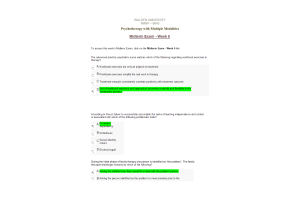
-300x200.png)



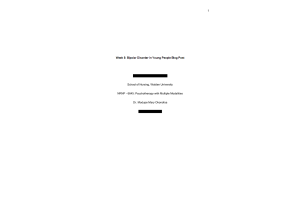


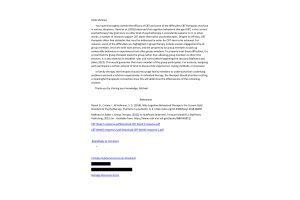





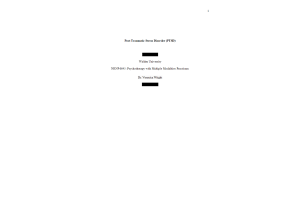
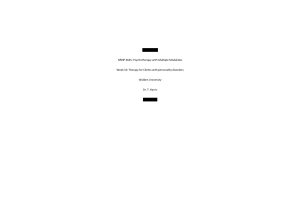



-300x200.png)